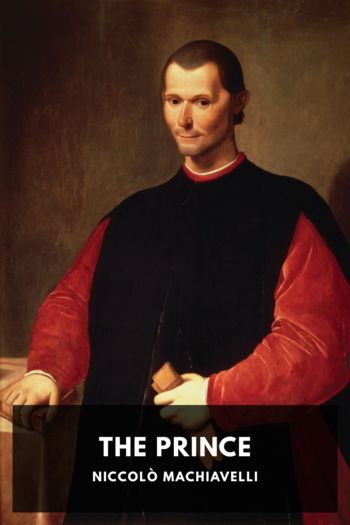The Prince, Niccolò Machiavelli [ebooks online reader .TXT] 📗

- Author: Niccolò Machiavelli
Book online «The Prince, Niccolò Machiavelli [ebooks online reader .TXT] 📗». Author Niccolò Machiavelli
But let us turn to France and inquire whether she has done any of the things mentioned. I will speak of Louis3 (and not of Charles)4 as the one whose conduct is the better to be observed, he having held possession of Italy for the longest period; and you will see that he has done the opposite to those things which ought to be done to retain a state composed of diverse elements.
King Louis was brought into Italy by the ambition of the Venetians, who desired to obtain half the state of Lombardy by his intervention. I will not blame the course taken by the king, because, wishing to get a foothold in Italy, and having no friends there—seeing rather that every door was shut to him owing to the conduct of Charles—he was forced to accept those friendships which he could get, and he would have succeeded very quickly in his design if in other matters he had not made some mistakes. The king, however, having acquired Lombardy, regained at once the authority which Charles had lost: Genoa yielded; the Florentines became his friends; the Marquess of Mantua, the Duke of Ferrara, the Bentivogli, my lady of Forli, the Lords of Faenza, of Pesaro, of Rimini, of Camerino, of Piombino, the Lucchese, the Pisans, the Sienese—everybody made advances to him to become his friend. Then could the Venetians realize the rashness of the course taken by them, which, in order that they might secure two towns in Lombardy, had made the king master of two-thirds of Italy.
Let anyone now consider with what little difficulty the king could have maintained his position in Italy had he observed the rules above laid down, and kept all his friends secure and protected; for although they were numerous they were both weak and timid, some afraid of the Church, some of the Venetians, and thus they would always have been forced to stand in with him, and by their means he could easily have made himself secure against those who remained powerful. But he was no sooner in Milan than he did the contrary by assisting Pope Alexander to occupy the Romagna. It never occurred to him that by this action he was weakening himself, depriving himself of friends and of those who had thrown themselves into his lap, whilst he aggrandized the Church by adding much temporal power to the spiritual, thus giving it greater authority. And having committed this prime error, he was obliged to follow it up, so much so that, to put an end to the ambition of Alexander, and to prevent his becoming the master of Tuscany, he was himself forced to come into Italy.
And as if it were not enough to have aggrandized the Church, and deprived himself of friends, he, wishing to have the kingdom of Naples, divides it with the King of Spain, and where he was the prime arbiter in Italy he takes an associate, so that the ambitious of that country and the malcontents of his own should have somewhere to shelter; and whereas he could have left in the kingdom his own pensioner as king, he drove him out, to put one there who was able to drive him, Louis, out in turn.
The wish to acquire is in truth very natural and common, and men always do so when they can, and for this they will be praised not blamed; but when they cannot do so, yet wish to do so by any means, then there is folly and blame. Therefore, if France could have attacked Naples with her own forces she ought to have done so; if she could not, then she ought not to have divided it. And if the partition which she made with the Venetians in Lombardy was justified by the excuse that by it she got a foothold in Italy, this other partition merited blame, for it had not the excuse of that necessity.
Therefore Louis made these five errors: he destroyed the minor powers, he increased the strength of one of the greater powers in Italy, he brought in a foreign power, he did not settle in the country, he did not send colonies. Which errors, had he lived, were not enough to injure him had he not made a sixth by taking away their dominions from the Venetians; because, had he not aggrandized the Church, nor brought Spain into Italy, it would have been very reasonable and necessary to humble them; but having first taken these steps, he ought never to have consented to their ruin, for they, being powerful, would always have kept off others from designs on Lombardy, to which the Venetians would never have consented





Comments (0)